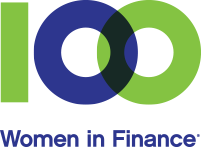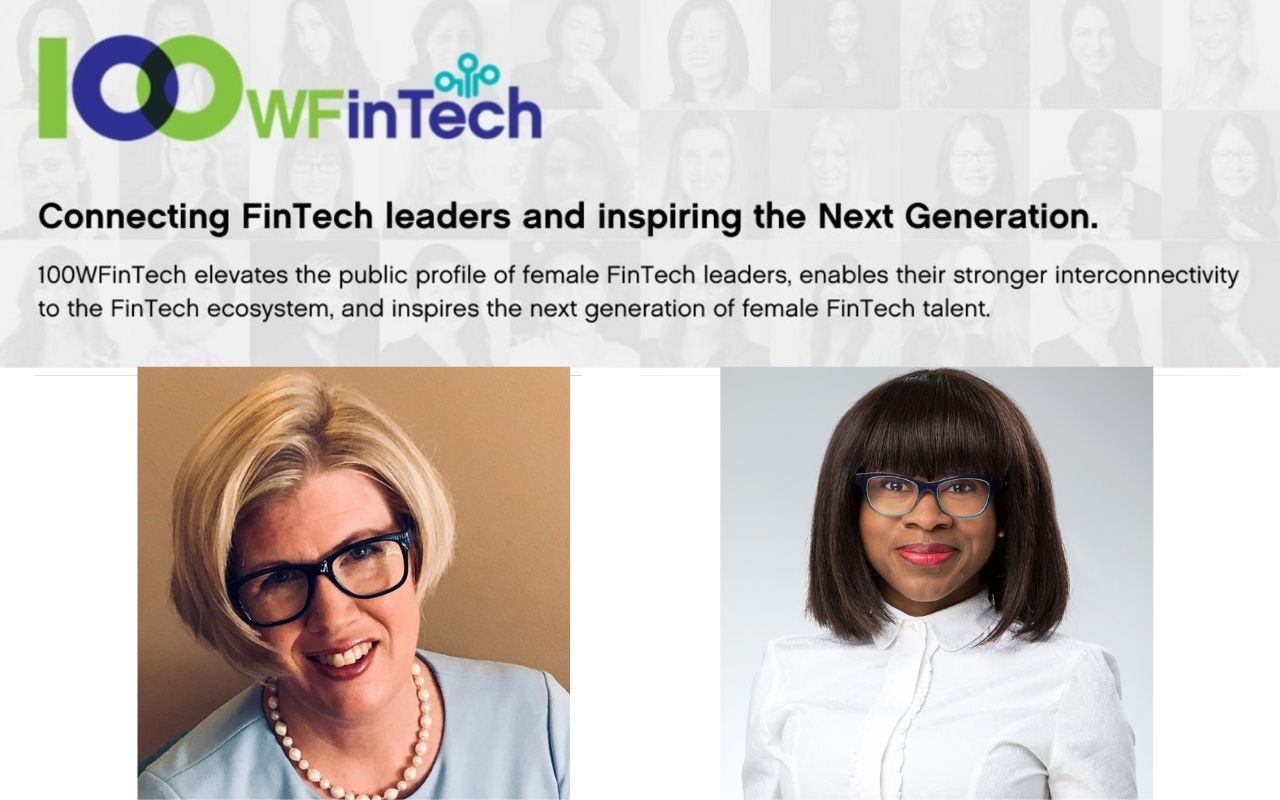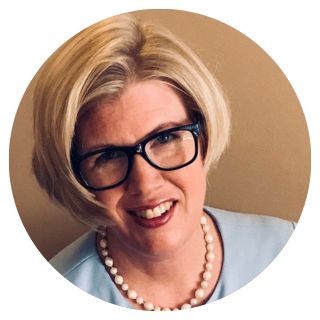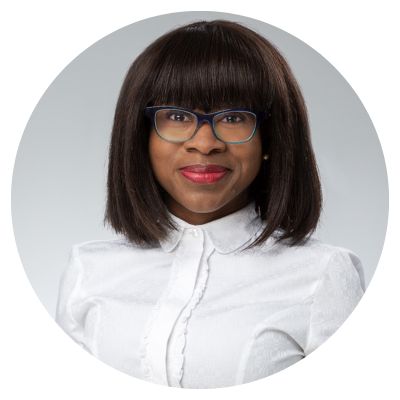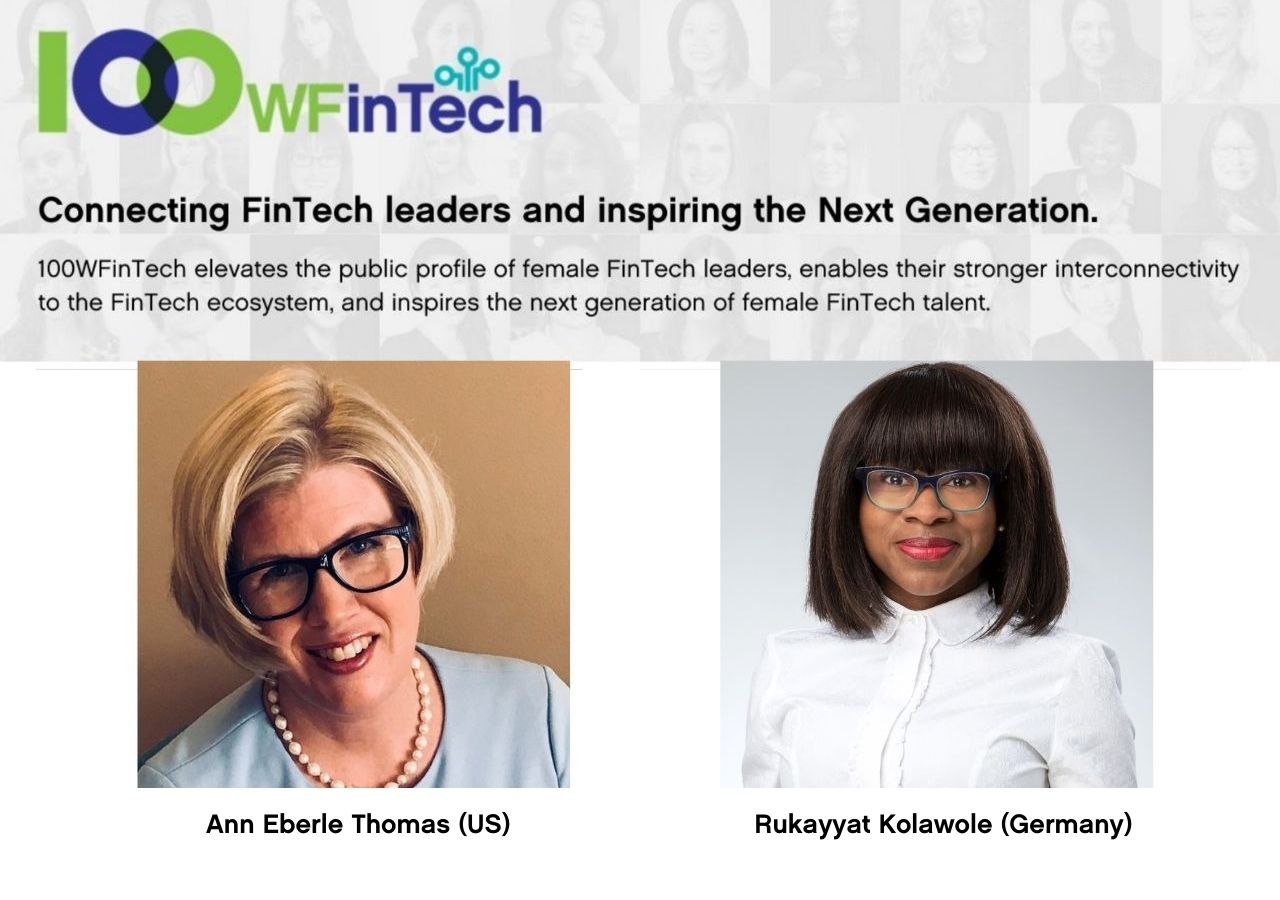
Worldwide, women are leading the way in building and funding disruptive technologies in fintech to advance businesses, broaden access, reduce the disparity in wealth, and transform how people invest in digital assets. Many of these women are featured in 100WFinTech’s Public Directory and are the changemakers in their respective fields in fintech.
This edition’s ‘100WFinTech Changemaker’ series, shares the journey, mission, and learnings of two senior fintech women in the Public Directory, Ann Eberle Thomas (US) and Rukayyat Kolawole (Germany). We tell stories of how the 100WFinTech Changemakers have created and leveraged opportunities that were open to them via their speech, writing, entrepreneurship, investing, and community building. We hope the stories of these female fintech leaders can inspire the next generation of finance professionals to build a better and more inclusive world by leveraging technology.
If these stories and missions resonate with you, please share them with your network, get in touch with us, or join the 100WFinTech Public Directory.
We are always looking for Changemakers to profile, please contact us if you know someone we should feature.
Ann Eberle Thomas,
Co-founder and Chief Revenue Officer, On Pepper
Location: United States/New York City
Website: www.onpepper.com
LinkedIn: www.linkedin.com/in/aet2010
Ann is a co-founder and the Business Partner at AssetTech innovator On Pepper. New York City-based Pepper is the leading Native-cloud and AI-based infrastructure platform for private asset management data. Passionate about helping alternative investment managers utilize technology across the asset lifecycle to solve tomorrow’s issues today, Ann utilizes her experience with business successes created by providing deep integration to bridge functional silos. She has been particularly excited to bring Pepper’s cutting-edge technologies to drive transparency, so deeply critical to the trust and relationships that are the core values of this industry.
Ann is an entrepreneur, executive and licensed attorney in New York. She spent more than 15 years as a corporate tax and regulatory attorney in financial services and banking, orchestrating the legal entity structure transition under Dodd-Frank for a G-SIB institution. Ann is an Advisory Board member of Marquette University’s AI2M program (Applied Investment Management and Disruptive Financial Technologies) and a founder of the MU Fin2 Women’s Network. She holds an LL.M-Tax from New York University Law School, a JD from the University of Wisconsin-Madison Law School, and a BA in Political Science and Business from Marquette University.
▪ ▪ ▪
Ann shared her vision and mission in building her start-up that uses data to drive efficiency, transparency, and returns in the private asset management industry and build trust in the financial services industry. She also discussed her insights into building her company and communities and what she is passionate about in the future of AI.
▪ ▪ ▪
What has led you to build OnPepper? What is your vision and your milestone?
Pepper was created from the direct experience and frustrations with the lack of effective technology to address the growing amount of data in the private asset management industry. It has been built by those who have gone through the pains of trying both siloed, point-based solutions and homegrown tools.
Pepper’s vision is to revolutionize the way that private asset managers do business, staying ahead of the curve, embracing innovation to unlock new opportunities, and empowering the trust and relationships that are a hallmark of their success. Pepper has strong alignment with its clients’ interests, ensuring that they maintain 100% control of their data and its usage.
We see our model as reflective of private asset management, with its focus on building relationships and long-term value for its clients. As a strategic partner, Pepper provides unparalleled technology and expertise to address capital allocation, AI-driven deal analysis and portfolio optimization for a fast-growing industry whose data has increased in diversity, density and complexity.
I like to illustrate the comparison to the public investment industry, which significantly predates the private investment industry, and has well-developed efficiency tools for its already very transactional, transparent and centralized ecosystem. In contrast, the modern private asset industry, which emerged in the 1980s and remained a bit of a fringe sector until the Global Financial Crisis (GFC), is much more deal-driven, decentralized and opaque. With its increasing growth and influence, it deserves to have the state-of-the-art tools to drive returns, efficiency and transparency.
Living through the GFC and aftermath at a major financial institution (I was on my honeymoon in Europe during the weeks Lehman folded and others teetered on the precipice; naturally wondering whether I would have a company to return to), I had a first-hand view of transparency gaps as a key catalyst. Afterwards, when working with information to determine the levels of risk across the numerous businesses, I dealt with inefficiencies of siloed systems that required time spent on verifying and aggregating data before it could even be analyzed. I saw the similarities on the private side, where the opportunities shed by the highly regulated banks landed. We call this the ‘Gray Rhino’.
What have you learned in the process? If you could redo the process, is there anything you would change?
One of the gifts from this role is that I learn something every single day – the iterative process of building a company, similar to the iterative process of building new technology, is to focus not only on building traction but also on taking our conversations, insights, and ongoing developments to continuously add value for our clients.
A key trait I have developed that has proven to be invaluable is patience. I have always had a keen focus on building relationships, and that trait has proven to be extremely important as we build our client base with Pepper’s new and unique value proposition as well as building out our company. Putting in the time and effort on both sides has been a lesson in building trust.
Are there any challenges when you build your company? Where do you receive the greatest support?
We made several key decisions at the outset of Pepper, and one of those was to put the initial earnings back into product and development. That approach is unconventional – most in our industry put it into sales and marketing. We felt strongly that putting a focus on searching, testing, and developing the most cutting-edge technologies was essential to address the complexities of data in the private asset management industry, as was to build a powerful engine that was domain-specific. It has paid off in droves, as we can provide solutions for deep issues and innovate in real-time to keep our clients getting to market with new opportunities.
We have really seen support across all aspects of the private asset management industry. The intersection of its increasing growth over the last decade, with advanced technology that will define the next twenty years, has created exciting buzz for our platform. Of course, the development of a number of Artificial Intelligence (AI) and Machine Learning (ML) tools has only added to that.
What would you do if you were not doing what you are doing?
I would be at another start-up or near start-up in the fintech industry. Alternatively, as a mother and member of society concerned about the pernicious and addictive items marketed as food today, especially to children, I would be more deeply involved in the community committed to addressing this issue.
Tell us about the communities you are involved in/have built. What have you learned that you can share with 100WF members?
While it pre-dates my time at Pepper, I volunteered at a non-profit connected with a school in its third year of operation and built out its fundraising, then moved into another leadership position for several years. Engaging with members of that community, and seeing the joy of everyone coming together for the common purpose of enriching education was one of the most meaningful experiences I have had. Most of the others were also contributing their time in addition to full-time jobs; it was particularly insightful to see how their talents and expertise could enhance our goals. It motivated me to ensure that I kept up my involvement in giving back to the community as I moved forward.
Supporting, promoting and encouraging women in the private asset management and fintech spaces was a natural next step as I entered two industries in which there traditionally have not been many women. As my network is closer to the financial space, I chose to focus on that area. It has also brought me closer to one of my alma maters (Marquette University) that I hold near and dear. Collaborating with fellow alums, and providing opportunities and insights to current students creates an energy that is exciting to be a part of. I do feel however, that there is so much more work to be done, and I am continuously inspired when I meet other women and networking groups in this space.
What are you most excited about in the future? Share an amazing fact people don’t know.
I think that many view AI as synonymous with Generative AI. It’s very exciting that the release of ChatGPT has generated such an intense interest in technology, but there are other types of AI/ML that are as important to use cases as GenAI, some of which we are building. I likely reflect the sentiments of others with the awe of how AI will change the landscape of work over the coming years, and we have barely begun. For instance, today, AI can give very generic answers to questions, but it cannot provide domain-specific knowledge that it has not yet been taught. The health industry is one example, and private asset management is another. We are putting resources into the latter, and it is absolutely fascinating to hear our technology team discuss the work and processes they are building. There are quite a few “humans in the loop” at this stage, and working with them is another fantastic part of my role.
What advice would you give someone wanting to follow a similar path, i.e., found a company?
Understand your appetite for risk in starting a new company, and enter with the mindset that the adventure in the journey is part of the success, and learn from your failures. That’s sometimes more easily said than done, but in a start-up, constant and continuous learning is critical to achieving success. It’s extremely important to have faith during those occasional periods when the road ahead seems to disappear, that it will appear again, typically even more clearly. I had twins who spent time in the NICU, and the most helpful mindset I learned was from the doctors – the smartest, most emotionally intelligent and empathetic individuals I have met, who referred to setbacks, both minor and major, as “bumps” in the road. While the management of a startup does not have the same weight of importance as a Neonatologist’s role, the “bumps” mindset has been a very useful tool to view the ups and downs.
I think the “Why” is very important, as in why it is important to the market that you are introducing your particular technology or product, and the value proposition that you are offering. Early on, as we were starting the momentum to gain market traction, those were particularly important discussions for us, and remain so as we develop.
It is also motivational to give back, even in the early stages, to feel that you are part of something bigger. At Pepper, we are weaving a program into place to give back 1% to organizations of our choice. I am working with my alma mater to help mentor students and feel I get as much out of it as I give.
”
Rukayyat Kolawole CFA, Founder of PaceUP Invest GmbH
Forbes Inspiring Founder
Women in Fintech Powerlist
Location: Mannheim Germany
Forbes Inspiring Founder
Women in Fintech Powerlist
Website: www.paceupinvest.com/
LinkedIn: www.linkedin.com/in/rukayyat-modupe-kolawole-cfa/
Rukayyat’s vision is to impact millions of people, especially women and underrepresented groups, and build sustainable and generational wealth via PaceUP Invest. PaceUP Invest, registered in Germany and Nigeria is the holistic, intelligent platform for financial well-being and wealth building.
Rukayyat has over 16+ years of experience in investment banking, investment management, and capital markets roles at Goldman Sachs, Bloomberg, Reuters, and BMCE International London where, as a VP in Capital Markets and Treasury, she covered EMEA, Americas, and APAC. Rukayyat is a transcultural communicator and leader resulting from her international assignments throughout her successful career. She is also the co-founder of Black Professionals Europe.
Rukayyat is an Executive Board member of European Women in Payments Network (EWPN), a founding committee member of 100 Women in Finance in Germany, and a mentor at The Migrant Accelerator and &ahead, Germany. She was listed in BWAM 40 under 40, Forbes Inspiring Founders Globally, and Innovate Finance Women in Fintech Powerlist. She is a keynote speaker and regularly partakes in panels globally. PaceUP Invest is listed as one of The Most Influential Financial Technology Firms of 2023 by The Financial Technologist.
Rukayyat earned an MSc in Finance and Investment Management with Distinction. In 2020, she earned a double Diploma Executive MBA at Mannheim Business School, Germany, and ESSEC Business School, France. She is a Chartered Financial Analyst.
She has a 6 year old daughter, author of the book Magical Baby, loves to travel, play golf, and meet different people of different cultures.
▪ ▪ ▪
PaceUP Invest was birthed during my executive MBA at Mannheim Business School, Germany, and ESSEC Business School, France as one of the few entrepreneurial projects. It was registered in September 2020, and we were granted the European trademark. PaceUP Invest started as a fintech for women only, but it did not have a hard stop on others from joining.
PaceUP Invest has evolved into a wealth tech company, aiming to make wealth-building accessible to all, not just the wealthy. In 2023, we integrated AI for financial literacy, planning, and personal finance management on the platform. Our focus now extends to companies, offering a seamless combination of digital and in-person financial well-being services, including debt management, savings, investing, retirement, and estate planning, to reduce financial stress and empower employees.
Our B2B products are used by financial institutions to help advisors improve customer financial literacy, increase satisfaction, and attract new clients through personalised AI-driven support. Additionally, we help sustainability teams in banks offer sustainable financial products in an understandable format. For non-financial institutions, our products help employees manage finances better, reducing stress and turnover while increasing productivity. We are open to discussions with companies on how they can help their employees/customers with our solution. We are also fundraising to further expand our reach globally.
▪ ▪ ▪
Why did you launch PaceUP Invest, and how did you become involved in the wealthtech space?
Two out of every three people are financially stressed and often feel ashamed to talk about it. These problems are due to a low level of financial knowledge, excessive debt, and an inability to build wealth. This is impacting the economy, with 600 billion Euros being lost every year due to financial and mental health stress. There is also a rise in inflation and the cost of living, which impacts mental wellbeing.
This issue affects people across all social levels, including those who have good jobs but are being let go and need to balance their finances for 12 months or so while finding a new job.
I speak to a lot of women and underrepresented groups in Germany who do not feel they are included and do not know where and how to invest. One specific relationship prompted me to launch PaceUp Invest as a business in September 2022, after my entrepreneurial project at Mannheim Business School and ESSEC Business School.
I met Katharina in April 2020 when the pandemic was starting. She had lost her job and the stress of financial dependence on her partner greatly affected her emotional wellbeing. She was subjected to emotional and financial abuse by her partner. She had no financial plan. The three problems affecting Katharina and many others are:
- Low level of financial literacy with very uncertain future financial freedom.
- In the past she had approached bank advisors to help with finances but was met with disregard and the lingo in the industry has not helped.
- She always thought men should deal with finances and her partner had dealt with it whilst not keeping her informed.
PaceUP Invest became a prosperous financial platform for Katharina with the help of human financial advisors and AI as co-pilot to take control of her financial planning and management for today, tomorrow and the future. She uses the AI agents to perform her personal finance tasks including creating her investment portfolio, Gen chat to simplify financial terms and ask specific questions in her natural language, and the use of humans for more complex needs to build her wealth gradually for herself and her children. She is less stressed, going through a separation and more financially independent.
We have seen how it benefited Katharina and it is being implemented at Katharina’s new employer for others, it is benefiting so many more across gender and intersectionality to build wealth sustainably and generationally too.
I am glad that the solution is not only for individual customers but also for businesses to help their employees and their customers. This is the multiplier of impact that is envisioned.
What have you learned in the process as a Black woman entrepreneur? If you could redo the process, is there anything you would change?
It has not been easy as a Black woman entrepreneur in Germany and has affected business partnerships with companies and also fundraising where I have experienced direct racism and discrimination. My background and cultural upbringing have helped me navigate and stay resilient and focus on the vision and mission.
I am Nigerian by birth with a lineage of strong entrepreneurial women who controlled and invested their money. My passion and reason for going into investment banking were a result of learning how my grandmother empowered women in her community. She was a gold trader who traveled to Ghana to buy gold and sold it in Nigeria. She taught me the basics of empowering women via money to build wealth in addition to the power of communities. I watched her do this seamlessly when I was growing up in Nigeria. Real wealth to her was about freedom.
My culture is Yoruba culture. A study by the University of California looked into female power in Yorubaland. Yoruba culture, of present-day Southwest Nigeria and the Southeast Republic of Benin, has received much attention from academics over time. In part, this is due to the culturally ingrained female power that has existed and persisted over time in Yorubaland. The goddess Aje, as the deity of the marketplace, provides an example of the importance of womanhood in Yoruba culture. The expressions of culturally grounded female power within Yorubaland are exemplary of the dynamic gender structure in Yoruba culture. Yoruba women have been able to harness female power to their advantage throughout Yorubaland over time. My cultural background keeps me resilient and focused.
I am a financial expert who is a woman, a financial expert with a CFA and MBA. I am sharing my stories and helping as a Black person, as a woman, and as someone from an underrepresented community, to create opportunities for other marginalized and disadvantaged people to build and access wealth. It is important to be a role model to others to see that they can also do this, dare to do this, and should do this!
We need more women and underrepresented people to start taking control of their finances and start investing and building sustainable and generational wealth!
Would I change any process? I recall a White lady telling me not to start the company in Germany as a non-German but to go to Asia as it might be difficult to succeed as a Black woman in the fintech scene in Germany. However, I have made Germany my home and would love to see more Blacks see that they can also build fintech, specifically wealth tech businesses here in spite of the challenges.
Why is your fintech very important for the Black community too?
PaceUP Invest is very important and valuable as we still see a lot of exclusion of Black people from full economic participation and this has an effect on wealth distribution, and accumulation. I, despite working in the finance industry for years, was nearly excluded till I decided to change banks. The power to choose where we put our money should not be taken for granted.
According to a CNBC survey: Half of Black U.S. adults and 49% of Hispanics don’t currently own individual stocks, mutual funds, bonds, exchange-traded funds, cryptocurrency, or real estate. Meanwhile, 32% of Asians and 28% of whites reported not being invested. Broken down by gender, 59% of Black women aren’t invested in anything, compared to 48% of Hispanic women, 34% of White women, and 23% of White men.
The gap can also be seen in retirement savings. The most glaring: Almost twice as many White men (63%) own a retirement account as Black women (32%), according to the survey. Only 33% of Black men currently have a retirement account. Additionally, Black households generally have less family wealth, according to the report. It estimated a $330 billion disparity between Black and White families in the annual flow of new wealth, with 60% of that coming from inheritances.
The 2021 Inclusion Initiative report by LSE (United Kingdom) highlighted that Black women – regardless of whether they are from the UK or elsewhere– experience the most significant pay gaps, compared to all men and all other women. The most substantive differences for Black women were found in finance, professional services, and big technology sectors. In these sectors, significant differences in pay persist up to the top 33% of earners.
I am yet to see such a report in Europe but I assume it will be worse than the US and in the UK. I speak to a lot of Blacks in Germany who do not feel they are included and do not know where and how to invest, or are being sold the wrong products. This is part of the reason why I started PaceUP Invest after three years of living in Germany and we have impacted a lot of people of different backgrounds to start investing by being inclusive.
According to Bloomberg, data reveals that significant economic advancements have been made in narrowing the wealth gap for some racial and ethnic groups. However, structural mechanisms continue to impact generations, forcing the brunt of wealth inequality onto certain groups. For every £1 of White British wealth, Indian households have 90-95p, Black Caribbean households hold around 20p, and Black African and Bangladeshi households have approximately 10p. This gap reflects the impact of historical discrimination and policy failures, such as the Windrush Scandal, compounded over time towards groups who have contributed significantly to the British economy.
We need to start thinking: What legacy are we leaving for ourselves and our children? How do we build to become wealthier? How do we stop being in the bottom 5%- and become economically wealthy? What do we own? What rights do we have?
I would like to see more Black people investing and taking generational wealth very seriously. Money is power. We need to understand how money can add value and be used to create value. My vision is to impact as many people as possible financially and leave the world better than I met it.
What would you do if you were not doing what you are doing?
Nothing else. I know this is my calling to help as many people as possible to be financially literate and build wealth on their own terms. To leave the world a better place and impact more generations financially.
What advice would you give to someone wanting to follow a similar path, i.e., launch a Wealthtech start-up that helps women and underrepresented communities build wealth and achieve financial well-being?
Go for it and do not be afraid if this is your deep calling to help humanity! It all starts with a deep understanding of consumer types, their individual journeys, and their specific and evolving needs. What problem needs to be solved and what is the best technology to solve it?
The below are very important too:
- Prioritize Self-Care and Well-Being
- Embrace Your Identity and Perspective
- Build a Support Network
- Know Your Worth and Advocate for Fair Treatment
What is the key takeaway you want to leave with the readers at 100 Women in Finance/100WFinTech?
We need to support more women in fintech via sponsorships, corporate partnerships, and allocating capital to help their businesses grow, especially female entrepreneurs.
The proportion of female to male in tech is still abysmal, and once we start to make dedicated efforts to support and invest in women entrepreneurs, we will build more sustainable business models that will ultimately impact the economy and humanity at large.
We need to act more and do less talking to ensure women’s leadership across all areas of finance!
This is the eighth article of our Changemakers in FinTech series. In the future, we will continue to feature FinTech book authors, TED Talks speakers, lecturers, and influencers from around the world.
If you are interested in collaborating with 100WFinTech, please visit our website and contact us here.
